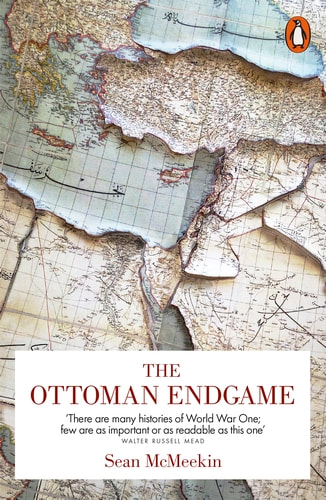|
The Ottoman Endgame: War, Revolution, and the Making of the Modern Middle East 1908 - 1923
By Sean McMeekin Published in 2015 592 Pages Thibault’s Score: 4/5 The collapse of the Ottoman Empire is one of the most important events in Middle Eastern history. Its age of decadence, followed by a century of civil wars, ultimately culminating in its defeat during World War One is the event that drew the borders of the modern Middle East. After spending the last year studying Ottoman History, it has been really mentally difficult for me to “bridge the gap” and understand how the events that I have studied resulted in the modern world. I love the writing style. The book is fast paced, incredibly clear, and easy to follow. Even without extensive background knowledge about the 20th century I was able to follow the events fairly well. The big picture geopolitics are very well explained; as well as the microscoping depictions of epic battles. In its last days, the Ottoman government found itself increasingly influenceable by European powers. As the Ottomans grew ever more economically and technologically backwards, it became increasingly easy for lobbyists backing various European factions to push the government one way or another. At different times, the Ottomans found themselves under the influence of pro-French, pro-German, and pro-British factions. As a result of this, it found itself in the dystopian position of constantly changing its alliances. One year, the Ottomans were at war with Serbia. The following year they were allied to Serbia, and at war with the Russian puppet of Bulgaria. Two years later, they were now allied to Bulgaria, and at war with Russia. The shifting constellation of alliances and allegiances isn’t the most important part of the story. The details of events in 1913 don’t matter very much when it comes to understanding the ultimate destruction of the Ottoman Empire. What matters far more is the fact that slowly, the Ottomans became so weakened they could do nothing other than serve the whims of various European masters - although no master had a monopoly. One fascinating microcom of the broader picture depicted by the book is how the Ottomans ended up joining the Central Powers during World War One. For centuries, the Ottomans had fought bloody wars against the Habsburgs for control of the Balkans. It would be fair to go as far as describing the Austrians as the traditional ethnic enemies of the Turks. In part as a result of their anti-Habsburg history, the French began supporting the Ottoman military through technology transfers and training programs. In the years leading up to World War One, the Ottoman army also began receiving similar material support from France’s enemy, Germany. Germany hoped to undermine France’s influence in the empire by providing similar levels of material and technical support. When World War One broke out, the Ottomans were initially neutral. On one hand, the Ottomans were long term rivals of the British who had supported Greece independence. The Germans promise to undermine the old geopolitical order and restore the Ottomans to power. Conversely, the French either urged neutrality or urged the Ottomans to join their fight against Austria and Germany. Furthermore, Bulgaria, the Ottoman Empire’s long term enemy, looked like it would imminently join the side of the Central Powers. However, France was allied to another long term Ottoman enemy: Russia. The first year of World War One was marked by political gridlock with pro-entente and pro-central powers lobbyists each attempting to force the Ottoman Empire to join a different side of the conflict. Out of the blue, the Germans would stage a geopolitical coup. German officers, who were already embedded in the Ottoman army, disguised themselves as Turkish sailors. They then commandeered an Ottoman ship, and began bombing the Russian embassy’s beachfront complex. Pro-German factions within the Ottoman government, who were likely working in league with the Germans, immediately published a deceptive account of the events that made it sound like the sailors had been Turkish rather than German, and that the Russians had made the first move, attacking them. Within days, the Russians retaliated by declaring war against the Ottomans. By the time the deception was figured out, it was too late. Britain had already deployed warships to launch a joint British-Russian invasion of Turkey; and the Ottomans were forced to defend themselves. The pro-entete faction of the Ottoman government would either fall in line, be executed, or go into exile. The Ottoman entry into World War One is just one - of many - fascinating events covered in this history. Others included the role of communist revolutionaries in ending the war, the stunning British failure in Gallipoli, how Saudi Arabia got its independence, and the Ottoman civil wars that would result in the creation of Turkey. I highly recommend this book to anyone who wants to understand why Turkey exists.
0 Comments
Leave a Reply. |
Thibault SerletMost of my articles are book reviews, but I also write about many other topics. Archives
December 2023
Categories |

 RSS Feed
RSS Feed